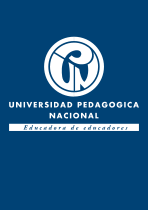What is the educational task? Arousing the desire for wanting to exist in the world in a grown-up way.

Citación
Fecha
2018-12-26Autor
Biesta, Gert
Enlace al recurso
https://revistas.pedagogica.edu.co/index.php/PYS/article/view/9498Keyword
EducationTeaching
Grown-up-ness
Egocentrism
Interruption
Curriculum
Educação
Ensino
Crescimento
Egocentrismo
Interrupção
Currículo
Metadatos
Mostrar el registro completo del ítemResumen
Las discusiones sobre educación a menudo están enfocadas en los propósitos que deberían lograrse o en los resultados que deberían producirse. En este artículo abordamos la cuestión del propósito de la educación de forma diferente, al preguntarnos en qué debería enfocarse el trabajo de los profesores y demás educadores. La respuesta que proponemos es que el objetivo de este trabajo es despertar en los niños y en los jóvenes el deseo de querer existir en este mundo, de la forma que denominamos como “adulta”. Explicamos nuestra idea de “crecimiento”, sobre la que argumentaremos que no deberíamos pensar en ella como el resultado de una trayectoria de desarrollo, sino como una forma en la que los seres humanos pueden tratar de existir en y con el mundo. Esto sugiere que es importante, en el trabajo educativo, interrumpir las formas en las que los niños y los jóvenes están completamente enfocados en sí mismos, llevándolos así al mundo en que solo se puede dar su existencia como sujetos adultos. La educación enfocada en eso tiene la tarea de ofrecer tiempo, espacio y formas curriculares a través de las cuales los niños y los jóvenes puedan trabajar “en” su crecimiento. Adicionalmente, la educación debe proveer sustento para que niños y jóvenes puedan recibir apoyo y nutrirse en su tarea de intentar existir de forma adulta.
Abstract
Discussions about education often focus on the purposes that should be achieved or the outcomes that should be produced. In this paper I approach the question of the purpose of education differently, by asking what the work of teachers and other educators should focus. The answer I propose is that this work is about arousing the desire in children and young people for wanting to exist in the world in what I refer to as a “grown-up” way. I explain my use of the idea of “grown-up-ness,” where I argue that we should not think of this as the outcome of a developmental trajectory but as a way in which human beings can try to exist in and with the world. This suggests, as I explain, that central to the work of education is the interruption of ways in which children and young people are entirely self-centred and self-focused, thus turning them towards the world in which their existence as grown-up subjects can only take place. Education that is focused on this has a task to provide time, space and curricular forms through which children and young people can work “on” their grown-up-ness. And education needs to provide sustenance so that children and young people can be supported and nourished in their task of trying to exist in a grown-up way.
Editorial
Editorial Universidad Pedagógica Nacional
Fuente
Colecciones
- Pedagogía y Saberes [660]
